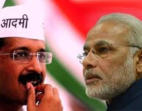





‘Knowledge is power’

Globe Effecting Local State Elections in India:
How did BJP Win in Some States and Lost in Others?
MIDDLE EAST
World’s
encyclopedic
knowledge
compacted
in
your
hand




Raise the vol to listen to the
lady airing awe @ the SINGLE author encyclopedia
You may also like:
Disturbing stats on black-white inequality
Now girls are a THIRD more likely to go to university than boys
Sound effect: Bhajans (Hindu faith songs) helping Autism
Lessening productivity 50% of Americans have worked with a hangover
Scientists say fist bump is healthier than handshake ?Hug & kiss
Meet Darknet, the hidden underbelly of the searchable Web


But then, with the chief ministership of Mayawati
alone bringing dignity to the Dalits and making
them vote for the BSP, the desire of the Dalits was
clear. BJP, therefore, did not lag behind. True to
attempting to unite Hindus as one block, they and
the RSS cadres assured the dignity of the Dalits as
Hindus, gave special treatment to their icons and
then citing the extra facilities given to Muslims it let
loose the 'us and them' factor.
Similarly, they made the Yadavas believe that they
were Hindus first. To spice it up, suddenly,
favouritism of Muslims in the cremation/burial
grounds issue cropped up. That aided the bringing
of
both the Dalits (untouchables) and the Yadavs to its fold. And when BJP's pro-poor programmes were
highlighted and Modi's charismatic speeches filled their receptive ears, both the BSP and SP did not get
their share of the traditional votes. The news of dis-enchantment of the Jats was news alone.
C. Choosing popular candidates:
Many a time the BJP disregarded its own long term workers and went for the popular names while
selecting candidates. In so doing, it not only limited itself to the ones in its own cadres and brought ones
from other parties, it did not mind other ones with bad backgrounds too.
D. Message of development:
Unlike the media fed none-performing Modi government, BJP run programmes for the poor, benefits of
the programmes like the controversial demonetisation, and its future development plans for all citizens
irrespective of their faiths or ethnicities were fed on to the voters. In totality, these created a platform for
the reception of messages offered. People were, therefore, very receptive to the messages offered by the
central leaders.
B. Micromanagement:
A. Not choosing the CM candidate:
UP had no unifying leader. And almost as in Delhi, choosing one would have brought resentment alone in
its work force. But then, with Modi alone uniting all, his name was propagated instead.
B. Using Modi's charisma:
With the bed of roses thus formed, and people willing to give an ear to PM Modi - unlike in unprepared
Bihar - people relished every word Modi uttered. The hard work of the workers paid off.
C Senior leaders on the ground:
In Bihar, almost reminding China before its famine, its leaders relied on the false data supplied by its local
workers. So much so that even a day before the results that gave them a massive loss, their leaders
where sure of a victory! Learning a lesson from that, now central leaders were not only deputed to give
speeches, leaders, including Amit Shah himself visited many many villages. They collected accurate data
from the ground and used them. This time their asserted certainty of victory was real and didn't go wrong.
Therefore, although, Amit Shah's name is silent, credit does go to him.
D. Weak opponent:
Whether fight in the Yadav family was just a show or was real is still debated, the sympathy accrued on
the junior Yadav's name was offset by the 'Elders will not allow him to work independently'. More
importantly, however, almost like the BJP cadres fighting amongst themselves in the Delhi's election, or
the discord between the BJP and RSS workers in Bihar, Congress and BSP workers did not have an
amicable relationship. That was despite the worm handshakes between the stalwarts, Rahul and
Akhilesh Mayawati had no idea of the change amongst the Dalits.
OTHER STATES;
Similar tactic was used in Uttarakhanda. It,
therefore, comfortably won there too. But then, its
loss in Punjab and Goa could have been easily
averted.
Punjab:
Let alone the realisation of an incumbency factor
effecting the BJP-Akali alliance, the drug addiction,
corruption and the law and order problems in Punjab
should have made the conjoint twins no hopers.
Everybody knew that Punjabis needed a change.
The desire for a change was so great that let alone the historically corrupt and none performing
Congress, people were ready to vote for the laughable AAP too. In this instance, BJP had a wonderful
opportunity to disjoin itself from the Akali Dal and go alone. The split would have given them the status
of a new party - a new kid in town - with its own strength - uninfluenced by the corrupt Akali Dal. This
new position itself, would have given them a listening ear. And if ground level work was managed like
in the UP, and the BJPs programmes were explained and future plans asserted things would have
been different. While this would have been enough to win against the 'one man party' of captain
Amarinder Singh, Modi's magic would have worked wonders. Not having created a receiving platform,
BJP was part of the guilty party that it failed to realise, and Modi's speeches had less takers. That was
BJPs mistake there.
Goa:
Factionalism and ineffective leader never brings about an election victory. Despite development, not
only several ministers but even the chief minister lost his seat. BJP should have been aware of the
factionalism in its ranks at least at the time of the election. Almost like putting all its eggs in one basket
- UP - the casual way that it looked at the Goa government vis-a-vis its voters was sure to make it a
casualty. Since Congress wasn't strong either, if only it had put UP like efforts there it would have
certainly tasted victory. And the central government would not have had to lose its defence minister.
Why is this win globally important?
Yes it is. This is because, although it was a local state election in India, it had global ramifications.
Since it is seen as voters transcending their religions and castes, and voting in line with development
and aspiration for the future, it adds to the dignity of India being the largest democracy in the world.
Yes, Indian democracy has to do more in order to be globally respected but this adds line of 'the
largest democracy' and 'good election commission' that brings dignity to India in the world. More
importantly, however, it dilutes the caste system's rigidity that brings Indians more in line with the
Modern Civilization.
Also, it was not the BJP alone that was frustrated with the lack of BJP's numbers in India's upper
house, foreign investors were frustrated too. Like the BJP, foreign investors also wanted India to get rid
of its archaic laws and bring about modern laws that were uniform, so that business could be done in
India with ease. Although, this majority by itself just gives BJP a majority in the local state assembly, it
does translate into the power of choosing more members in India's upper house. Once that is done,
leaving aside the power of electing the country's president, that upper house majority will make it easy
for the present government to erase archaic laws and form modern ones. While this will make India
modern, it will help the international community do business with India, with ease.
With India boasting huge consumer base, globally understood language, cheap labour etc. addition of
modern laws means a lot to the international community. This is why, despite being a local election it
has a global ramification. Trump ringing and congratulating Modi does say something. That is why this
article is written.
-------------
12

The Dalits

Kejriwal in Punjab





WOMEN’S POWER: ITS PAST, ITS PRESENT, ITS FUTURE: FEMOCRACY
WEB PAGES
OUR OFFERING
UPLOADED ITEMS
OUR EMAIL
kri200@womenspowerbook.org
QUESTION



















